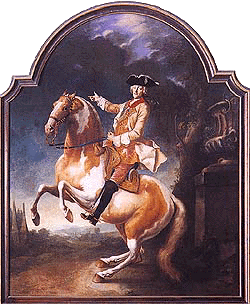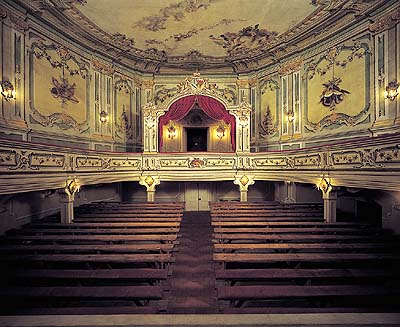Baroque Magnate Joseph Adam zu Schwarzenberg
 Joseph Adam zu
Schwarzenberg was born in 1722 in Wien. His childhood was marked by
the tragical death of his father, Adam Franz zu
Schwarzenberg duting an Imperial
Hunt. Nevertheless, his close circle of older companions tried
to make up for his lack of a father. Even emperor Charles VI von
Habsburg showed affection to him more than to anyone else. Partly
it was due to his feelings of guilt and responsibility for the
death of the prince Adam Francis. Already at the age of ten, Joseph
Adam was awarded the Order of the Golden Fleece by the emperor.
Until the time when he reached maturity, the administration of the
family property was taken care of by his mother Eleanor Amelia and
other guardians. When his mother died in 1741, Joseph was nineteen.
Soon afterwards he was declared to be of age and the same year he
married Mary Teresa, born of Liechtenstein. The bride came from a
very respectable aristocratic family that owned, like the Schwarzenbergs,
extensive property. The princess was said to be one of the most
beautiful women in the country. The marriage of Joseph Adam and
Mary Teresa was a very happy one. Already in 1742, they had a son
Johann
Nepomuk zu Schwarzenberg who assumed the administration of the
family property after the death of his father in 1782. The couple
had eight more chidren besides Johann Nepomuk, but two of them died
in childhood.
Joseph Adam zu
Schwarzenberg was born in 1722 in Wien. His childhood was marked by
the tragical death of his father, Adam Franz zu
Schwarzenberg duting an Imperial
Hunt. Nevertheless, his close circle of older companions tried
to make up for his lack of a father. Even emperor Charles VI von
Habsburg showed affection to him more than to anyone else. Partly
it was due to his feelings of guilt and responsibility for the
death of the prince Adam Francis. Already at the age of ten, Joseph
Adam was awarded the Order of the Golden Fleece by the emperor.
Until the time when he reached maturity, the administration of the
family property was taken care of by his mother Eleanor Amelia and
other guardians. When his mother died in 1741, Joseph was nineteen.
Soon afterwards he was declared to be of age and the same year he
married Mary Teresa, born of Liechtenstein. The bride came from a
very respectable aristocratic family that owned, like the Schwarzenbergs,
extensive property. The princess was said to be one of the most
beautiful women in the country. The marriage of Joseph Adam and
Mary Teresa was a very happy one. Already in 1742, they had a son
Johann
Nepomuk zu Schwarzenberg who assumed the administration of the
family property after the death of his father in 1782. The couple
had eight more chidren besides Johann Nepomuk, but two of them died
in childhood.
Joseph Adam devoted a certain part of his life to performing various functions and roles at the imperial court. He was a Secret Councillor, the supreme Knight Marshal (1754) and the supreme Court Administrator of both empress Mary Teresa and emperor Joseph II (1776). When he was appointed Knight Marshal, the function did not carry such a vast sphere of activity as it used to, so the prince managed to persuade the empress to declare his office as of equal value as the other court offices. This didn't especially meet with the approval of the other court dignitaries.
The greatest contribution to the family of Schwarzenbergs achieved under the rule of prince Joseph Adam can be considered the extension of the princely title to all members of the family in 1746. Princely children were then called princes and princesses according to French terms. The acquirement of this privilege helped to accentuate the respectability of the entire family and is recognized even by present descendants of the Schwarzenbergs.
Among all the regulations declared by Joseph Adam in favour of his employees, the foundation of the employees' retirement fund in 1765 was the foremost one. Whole generations of officers and employees made use of its beneficial effect. The fund was dissolved in 1950, when it was transferred to common state benefits for the elderly. The employees thus lost a real fortune without any compensation at that time.
Joseph Adam zu Schwarzenberg had a special liking for construction engineering, social life and music. It was mainly the castle of Český Krumlov that benefited from these. In 1748 he had the Masquerade Hall built adorned with paintings by Joseph Lederer. Then he rebuilt the castle chapel of St. George, ordered a winter riding hall to be built, rebuilt the summerhouse Bellarie in the castle park as well as the castle theatre with paintings by Hans Wetschel and Leo Märkel. He had the castle garden enlarged and the Cloak Bridge rebuilt. Baroque adaptations inside the castle were also completed in the meantime, thus the castle became a very comfortable place to reside and looked like a real duchy residence (see Český Krumlov Castle in the Baroque Period).
 Already the third noble
band in succession (after the Rosenberg and Eggenberg ones) was the
Schwarzenberg band at the castle Český Krumlov under the rule of
prince Joseph Adam. Its members held a good position at the court.
During the 1760s the Schwarzenbergs became much more interested in
music than they used to be, and so an eight member brass band of
high quality originated that became one of the best known chamber
ensembles of that time. (see History
of Music in Český Krumlov). The prince saw to it that both he
and his family as well as some of his employees took part in the
music life - not only in their residence in Vienna, but wherever he
went with his court. When the activity of the brass harmony band
ceased, no other permanent music ensemble existed at the
Schwarzenberg court. Nevertheless, the family members went on
supporting music and taking an interest in it. That included for
example giving preferential employment priority to the court
services to those with musical knowledge.
Already the third noble
band in succession (after the Rosenberg and Eggenberg ones) was the
Schwarzenberg band at the castle Český Krumlov under the rule of
prince Joseph Adam. Its members held a good position at the court.
During the 1760s the Schwarzenbergs became much more interested in
music than they used to be, and so an eight member brass band of
high quality originated that became one of the best known chamber
ensembles of that time. (see History
of Music in Český Krumlov). The prince saw to it that both he
and his family as well as some of his employees took part in the
music life - not only in their residence in Vienna, but wherever he
went with his court. When the activity of the brass harmony band
ceased, no other permanent music ensemble existed at the
Schwarzenberg court. Nevertheless, the family members went on
supporting music and taking an interest in it. That included for
example giving preferential employment priority to the court
services to those with musical knowledge.
The statements of one of the close friends of the family of countess Thürheim who owned a mansion on the Austrian side of the state border are also very interesting. In an attempt to characterize the lovely relationship of the Schwarzenberg couple she praised the princess´ prudence. She knew both about their financial troubles and about the fact the princess was a bit sceptical about her husband´s methods of managing the property and his striking thriftiness. During the war, the prince had financial troubles particularly in connection with paying war taxes and reparations for damages caused by soldiers. When the situation calmed, his character changed a little bit as well. He devoted his time to his family, hobbies and social life intensively, mainly in Vienna where he used to go with his wife to the theatre, various concerts and balls. He did not like to attend church celebrations but regarded them as necessary. After twelve years of marriage, princess Mary Teresa died in Vienna in 1753. The prince was something over thirty but never married again, in spite of the fact he did consider the possibility.
 Joseph Adam didn't have
many opportunities how to increase his property. He bought only
Nový Hrad, a mansion in the western part of Bohemia (1767). The
revolutionary fervor of the 1770s caught the prince in full power.
In 1775 he stood up against displays of the unrest of his subjects
successfully, particularly at the mansion of Vlčice in the
northeastern part of Bohemia. Prince Joseph Adam was very
particular of his position and he liked being awarded various
distinctions and honours, especially when he was older.
Joseph Adam didn't have
many opportunities how to increase his property. He bought only
Nový Hrad, a mansion in the western part of Bohemia (1767). The
revolutionary fervor of the 1770s caught the prince in full power.
In 1775 he stood up against displays of the unrest of his subjects
successfully, particularly at the mansion of Vlčice in the
northeastern part of Bohemia. Prince Joseph Adam was very
particular of his position and he liked being awarded various
distinctions and honours, especially when he was older.
He died in Vienna on the 17th of February 1782 and was buried in a vault at the Augustinians.
(jz)


